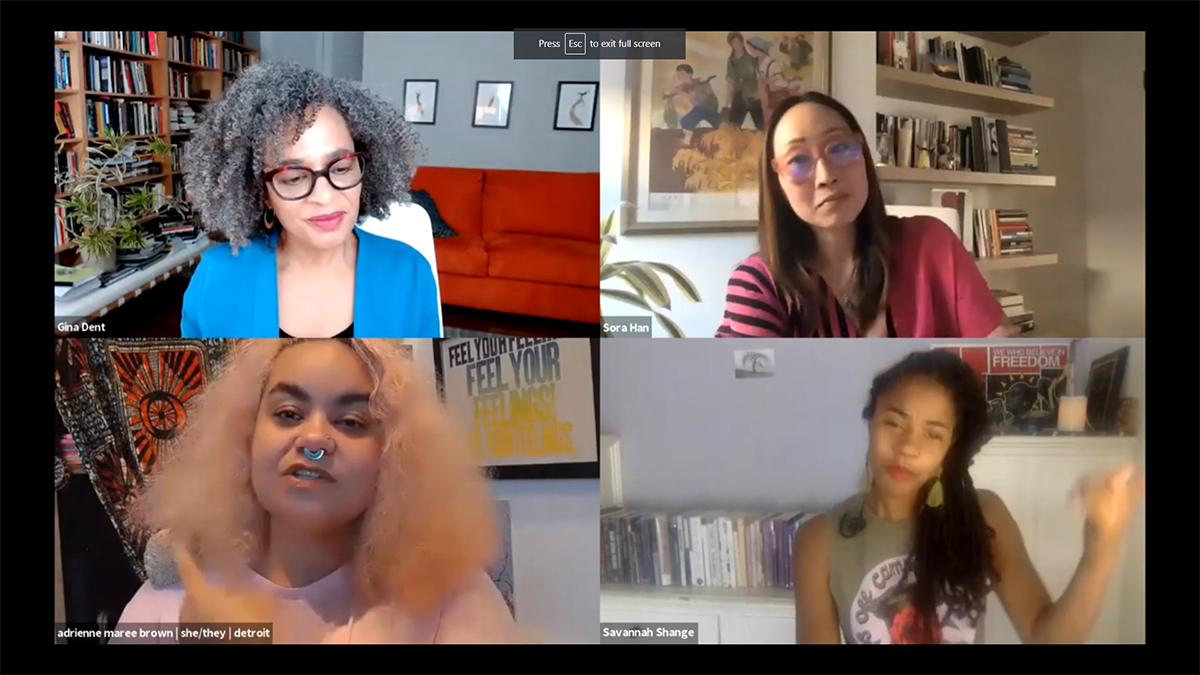“Paso Seguro”: Demanding Safe Passage For All
City on a Hill Press Bryce Chen, March 17, 2025 On a field of green grass overlooking Monterey Bay, around 150 people sat with their...



L
For the next Visualizing Abolition event, join legal and popular culture theorist Sora Han, author and activist adrienne maree brown, and urban anthropologist Savannah Shange for a conversation on strategies, activism, and liberatory futures. What are the creative and radical abolitionist methods that are creating the future that “we long for,” in brown’s words, in the present?
Futures
w/ Sora Han, adrienne maree brown and Savannah Shange
Featured Music Video – Social Science
May 11, 2021, 4-5:30 p.m. PT
Online event: Registration required
Visualizing Abolition is a series of online events organized by Professor Gina Dent, Feminist Studies and Dr. Rachel Nelson, Director, Institute of the Arts and Sciences. The events accompany Barring Freedom, an exhibition of contemporary art on view at San José Museum of Art, October 30, 2020-April 25,, 2021. Solitary Garden, a public art project about mass incarceration and solitary confinement, is concurrently on view at UC Santa Cruz.
Sora Han is the Director of the Culture & Theory Ph.D. Program at UC Irvine, and an Associate Professor of Criminology, Law and Society with courtesy appointments in the School of Law and African American Studies. Her first book, Letters of the Law (Stanford University Press 2015), extends the theoretical insights of critical race theory to produce new readings of American law’s landmark decisions on race and civil rights. She is also the co-author of the law casebook, Comparative Equality and Anti-Discrimination Law, Third Edition (Edward Elgar Publishing 2020). She is currently working on two books: Slavery as Contract: A Study in the Case of Blackness, which brings together poetics, contract law and afro-pessimist theory to think beyond the property metaphor of slavery; and Mu, the First Letter of an Anti-Colonial Alphabet, an experimental text on the “anagrammatic scramble” (Nathaniel Mackey) of the unconscious materiality of abolitionism. Recent publications on these new lines of research include “Slavery as Contract,” in Law and Literature (2016) and “Poetics of Mu” in Textual Practice (2018).
adrienne maree brown is the writer-in-residence at the Emergent Strategy Ideation Institute, and author of Holding Change: The Way of Emergent Strategy Facilitation and Mediation, We Will Not Cancel Us and Other Dreams of Transformative Justice, Pleasure Activism: The Politics of Feeling Good, Emergent Strategy: Shaping Change, Changing Worlds and the co-editor of Octavia’s Brood: Science Fiction from Social Justice Movements and How to Get Stupid White Men Out of Office. She is the cohost of the How to Survive the End of the World, Octavia’s Parables and Emergent Strategy podcasts. adrienne is rooted in Detroit.
Savannah Shange is an Assistant Professor of Anthropology at UC Santa Cruz and serves as principal faculty in Critical Race & Ethnic Studies. Her research and teaching interests include state violence, late liberal statecraft, multiracial coalition, ethnographic ethics, queer politics, and abolition. Her book, Progressive Dystopia: Abolition, Anti-Blackness and Schooling in San Francisco (Duke 2019) is an ethnography of the afterlife of slavery as lived in the Bay Area.
Visualizing Abolition is organized by UC Santa Cruz Institute of the Arts and Sciences in collaboration with San José Museum of Art and Mary Porter Sesnon Art Gallery. The series has been generously funded by the Nion McEvoy Family Trust, Ford Foundation, Future Justice Fund, Wanda Kownacki, Peter Coha, James L. Gunderson, Rowland and Pat Rebele, Porter College, UCSC Foundation, and annual donors to the Institute of the Arts and Sciences.
Partners include: Howard University School of Law, McEvoy Foundation for the Arts, Jessica Silverman Gallery, Indexical, The Humanities Institute, University Library, University Relations, Institute for Social Transformation, Eloise Pickard Smith Gallery, Porter College, the Center for Cultural Studies, the Center for Creative Ecologies, and Media and Society, Kresge College.